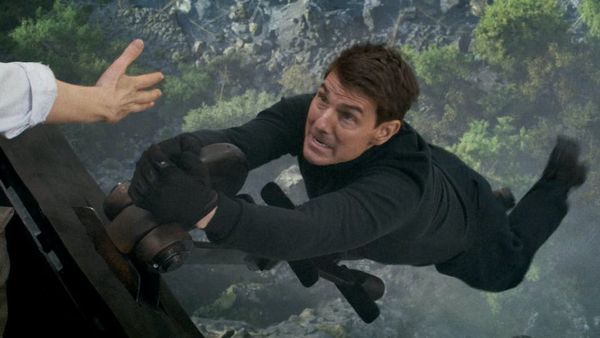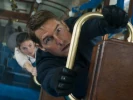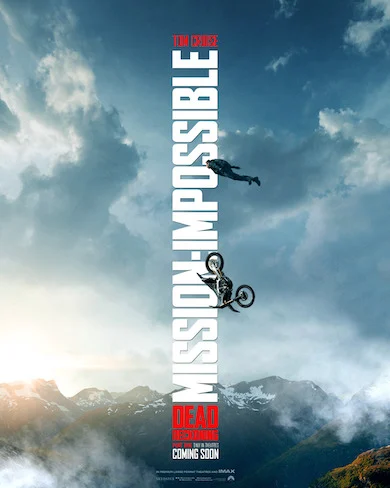Eye For Film >> Movies >> Mission: Impossible - Dead Reckoning Part One (2023) Film Review
Mission: Impossible - Dead Reckoning Part One
Reviewed by: Andrew Robertson

Your mission, should you choose to see the ponderously titled Mission - Impossible: Dead Reckoning Part One, isn't just to watch Tom Cruise and his chums throw themselves about with heroic abandon but to think about stories.
For various reasons I was reminded of three somewhat apocryphal tales. We'll gloss over the boundaries between technothrillers and Science Fiction though I'm with Bruce Sterling who defines the former as the latter "with the president in it."

After The Hunt For Red October came out, author Tom Clancy was visited by the FBI about classified information. He explained all his sources were public, and that in the places where things weren't he built on known capabilities to get to where he needed them for his story.
During the Manhattan Project, though one doubts it'll appear in Oppenheimer, Cleve Cartmill wrote a story called Deadline. That was published in pulp magazine Astounding. It described, quite accurately, a nuclear weapon. The FBI visited him too, and also the offices of editor Joseph W Campbell. They went away with the explanation that it had been derived from publicly available sources. Campbell apparently declined to tell the G-men he knew there was something big happening at Los Alamos because so many of his subscribers had moved there.
Between those two, a screening of 1983's Wargames is believed to have led then President Reagan to issue National Security Decision Directive Number 145. It includes this text: "Systems which generate, store, process, transfer or communicate classified information in electrical form shall be secured by such means as are necessary to prevent compromise or exploitation."
Those necessary means would seem, on this evidence, to include a lot of car chases. They're not just kinetic spectacle, but a part of Part One's efforts to revisit elements from Missions: Impossible past. There are hints of an origin story, though parts of it are sufficiently dated that one wonders if they were found at the back of the fridge. There's a heavy debt to to plot points and characters created for Ghost Protocol and Fallout. There are even camera angles borrowed from the first outpost in the franchise, all the way back in 1996.
Brian De Palma, John Woo, JJ Abrams, Brad Bird, all made a mark in films full of murky business, but Christopher McQuarrie's arc is more of a whole. There were 171 episodes of the TV show, but even with the involvement of Abrams this is more of Desmond Llewellyn's Q than John de Lancie's. If Mission: Impossible were to have a Skyfall that didn't involve an A400M Atlas or the Burj Khalifia, Dead Reckoning is it. The Spectre of this and other franchises looms as large as any of the landscapes.
There's that big stunt in the trailer, a motorcycle jump, and even knowing that it's coming the build up to it is thrilling. There's more, some going on for longer than seems useful. An extended sequence in Rome seems to be trying to replicate each car chase from the Bourne films, though in the process it's also cadging crashes from other driving in this franchise. There's even a nod to Lupin III. That evolving action sequence isn't the only one. A train might seem long when you're waiting at a level crossing but the one here rivals Snowpiercer for ponderousness.
Cast members also come back. Simon Pegg's been around since three and Ving Rhames started outside the wire back in one. There's more of that same mixture of the disavowed and the disassociated. It was James Jesus Angleton who used the phrase "wilderness of mirrors" to describe counter-intelligence but he wasn't locked into a three act structure and a Batman-esque need for antagonists to be reflections of protagonists.
Vanessa Kirby and Rebecca Ferguson return, joined by Pom Klementieff and Hayley Atwell. All have action chops. Atwell in particular, as Grace, is cast into a mould established back in 1996 and per flashback one struck even earlier than that. I don't think every single female character in the franchise exists for some ratio of romance and regret, but patterns are everywhere.
Dates of other kinds become important. This is probably the near future (2024 at least) but real life situations complicate some situations further. The fourth Russian ship Sevastopol was renamed for the Paris Commune after her crew were part of the Kronstadt Rebellion, and the politics around what would be a seventh in this seventh film are equally complex. Whether Russia has a right to name things such is another reason it feels like scripts from the Sixties could be dusted off and dressed up anew.
Success has many tailors, and so beyond McQuarrie and Cruise, writer Erik Jendreson joins behind the camera. He's probably best known for Band Of Brothers, but his CV includes all manner of oddities. There's not much of that weirdness here, beyond the blurring of science fictional boundaries already masked off by the series. There are nods to Reality and STUXNET, but some techno-soundtracked sequences owe less to The Matrix than latter John Wick.
There's a reference to driving a stake through a heart, and between disappearing magic and the running habit of Hunt running from hunters there's a real sense of mythology. The return of Henry Czerny is part of that. In about a hundred roles he's played about as many intelligence agency directors as he has priests. Differently opposite Ethan Hunt is Gabriel, though something about Esai Morales' mellifluous tones reminded me of the voice work of Maurice LaMarche. There's an element of the supernatural there too, Cruise may have been a vampire way back in the interview but he's one of many with an unequal relationship with death.
The game of numbers continues with the MacGuffin, a variously cruciform device. It's one of several key structures and puzzles through the film. What it unlocks is established in the opening sequence, but what that means unfolds through the film. At 163 minutes, Part One is very long as a first act, but given how much it builds from previous outings that length is a gratuitous undercount. As with Dune, and even knowing where that story was going, it doesn't seem entirely fair to judge something that repeatedly makes clear it's about pairs, halves, counterparts. That doesn't mean audiences won't.
There's spectacle, action, even what passes for romance given the usual impediments, a few jokes that aren't at the expense of electric cars and a fair bit of physical comedy. Repeatedly invoking the notion of validation through counterpoint, this is perhaps inevitably unbalanced as it's a first leg. There's probably enough here to get folk into seats, but as with the train journey at the climax it's not clear if they'll invest in a return ticket.
Reviewed on: 05 Jul 2023



















